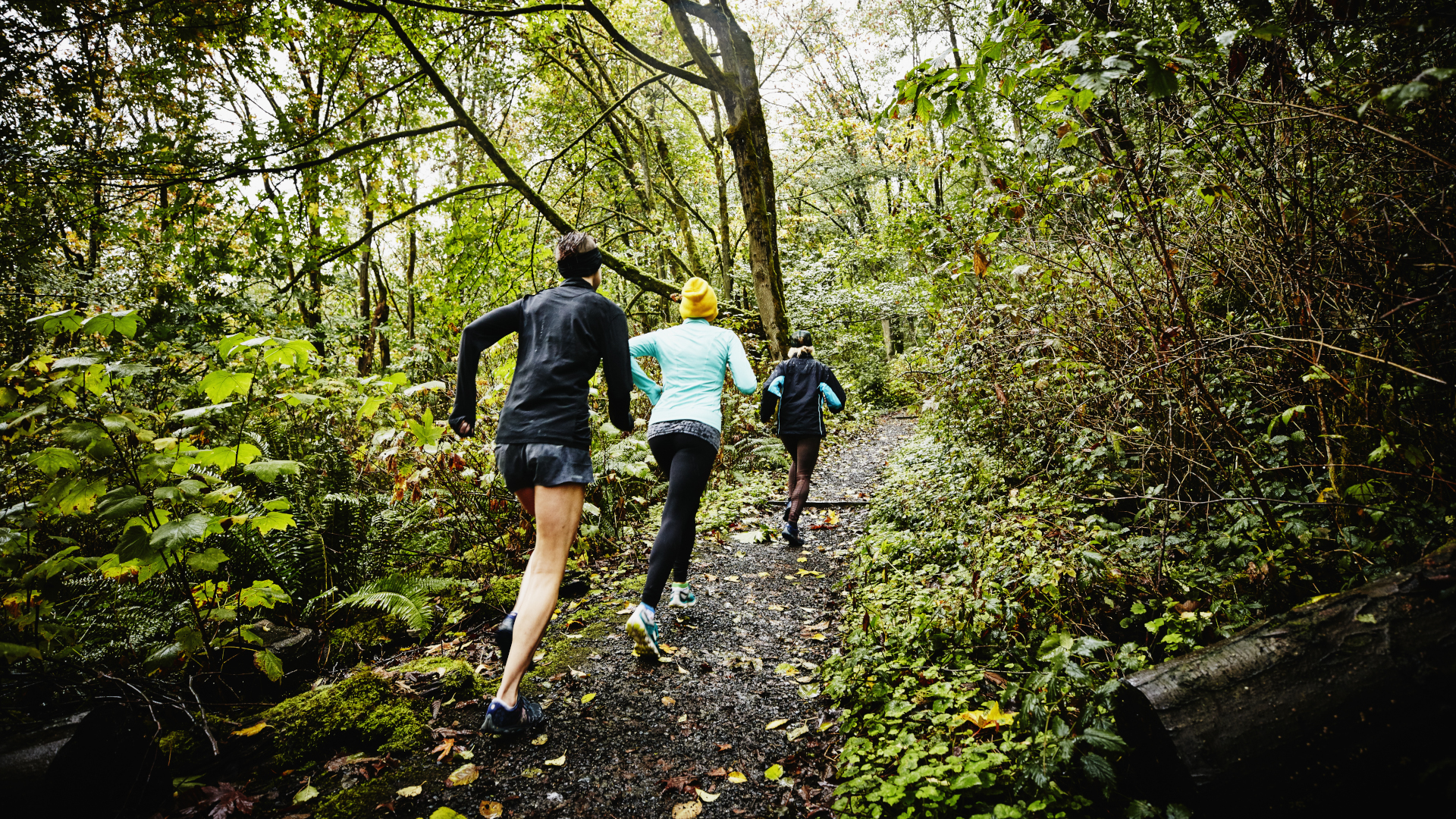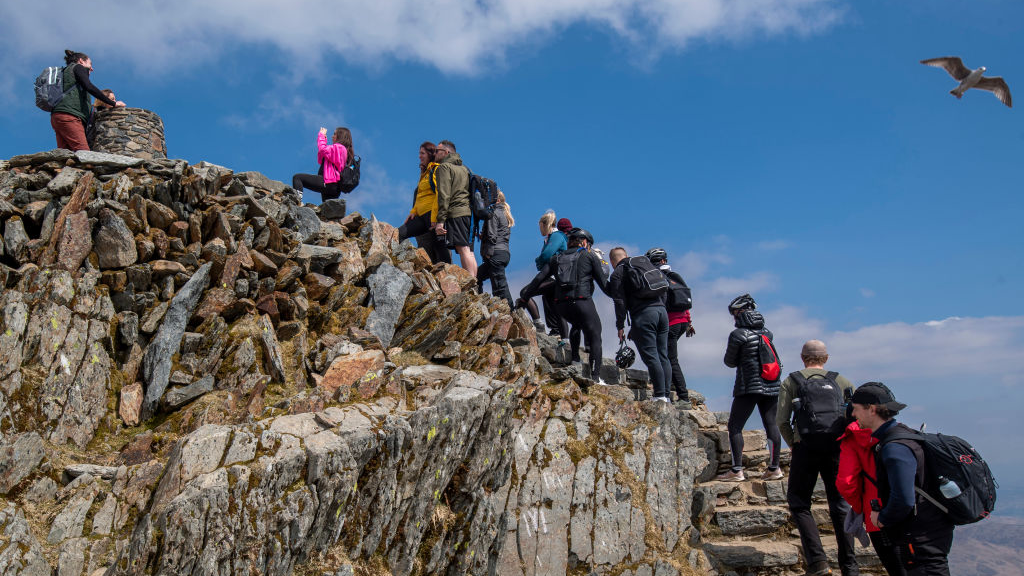Why it pays to be a slow runner (and why I’m not speeding up)
Slow runner? We look at what a slow pace actually means, how it can benefit you to be a tortoise rather than a hare, and how to slow down if you’re a gazelle

I have a confession to make: I’m a slow runner. No matter how much I run, my running pace never changes. In a typical week, I hit the hills in my best trail running shoes twice, both times for a six mile run, and it always takes me an hour. It doesn’t matter what trail I’m on, whether I’m tired or rested, it takes me one hour. I’ve been doing this for a couple of years and while it’s definitely easier than it was for the first few months, I never get any faster. Yes, I know all about the science and benefits of varying your running pace, and I believe in them totally, I just don’t actually subscribe to them. I’m a slow runner, and I’m owning it.
The truth is, I enjoy my runs. I can afford the hour, my heart rate gets up but not so much that I feel ill or depleted. I feel challenged and my legs are satisfyingly tired afterwards. I love listening to the birds and watching the sun rise over the Scottish hills. My legs are stronger since I started this regime a couple of years ago and I have no interest in competing with others, so I don’t see any great reason to speed up. It’s true that, on the rare occasion I do run on the pavement, I’m occasionally a little startled to catch sight of the woman plodding along reflected in the shop window. Is that really what I look like? But other than appearances, I’m happy with my slow running pace.

Occasionally I’ll bring this up with other runners, and almost without exception they launch into what training techniques I can incorporate into my routine to get faster. They mean well, so I act interested, but I’m actually not. I’m sticking with being a slow runner and if you’re a slow runner too, I’m here to say, don’t sweat it. Let’s take a look at what a slow running pace actually means, how it can actually benefit you to be a tortoise rather than a hare, and how to slow down if you’re a natural gazelle.
What is a slow running pace?
First, there’s no such thing as a slow running pace, there’s just your slow running pace. If you were to mix up your running workouts between base runs, long runs, sprints and intervals, over time, you’d get an idea of your fast pace, your slow pace and your average pace. If you want to compete or achieve a timed goal, this would be really useful information. You could extrapolate that data out to figure out how long it might take you to run a certain distance, or what pace you’d need to get to in order to achieve your goal.
If like me, however, you’re just running for the joy of running, you don’t really need to worry about any of that. So why am I calling myself a slow runner if there’s no such thing? Well, I’m aware by the frequency with which other runners pass me when I do occasionally run in the city – and the fact that I’ve probably never passed anyone else – that I must be slower than the average runner. I’m also aware that I could run faster if I wanted to, I just don’t want to. I’ve also never made any gains in my pace which indicates that either I started out very fast, which at 10 minute miles we know isn’t true, or I’ve just never speeded up. So either everyone else in the world is fast or, on average, I’m a slow runner, even if my pace doesn’t sound all that slow to you.

Why am I such a slow runner?
There are several reasons why you might be a slow runner, and not all of them are a problem. After all, if like me, you just enjoy running for running’s sake, it doesn’t really matter why you do it slowly. Perhaps you just prefer it, perhaps that’s just how you’re psychologically inclined, maybe it’s just down to your body mechanics.
However, there are some possible reasons for your slow running pace that indicate a problem. If you’re a slow runner because of a physiological deficit, such as not getting enough sleep, calories or a condition like low iron, you’d want to address the issue which will improve your overall health as well as helping you to run faster if that’s your goal.
Advnture Newsletter
All the latest inspiration, tips and guides to help you plan your next Advnture!
Further, if you’re getting all the sleep and fuel you need and your iron levels are normal but you’ve still plateaued and you want to get faster, then you’d want to mix up your running workouts to make some gains.

What are the benefits of a slow running pace?
Not only do I like running slowly, I've actually come to understand that it might be better for me. To understand the benefits of a slow running pace, it’s actually helpful to understand how fast-paced running can be harmful to your health, when it’s done in excess.
We all know that there are physical (and mental) benefits associated with running. It’s good for conditioning your cardiovascular system and, according to the American Heart Association the benefits of increased cardiovascular fitness include reduced body weight, blood pressure, cholesterol and insulin sensitivity. All good stuff. However, a 2018 study conducted by the Radboud Institute for Health Sciences in the Netherlands found that high volume, high intensity and long term running actually produced cardiovascular damage. So those heart health benefits we all tout as associated with running might go out the window when you’re overdoing the pace along with distance and frequency.

Running is also correlated with a lower risk of premature mortality, but again, slower runners seem to win out here. A 2015 study published in the Journal of the American College of Cardiology examined 1,098 healthy runners and 3,950 healthy non-runners over a 14 year period found that the lowest risk was among the slow runners, followed by moderate runners, while strenuous or fast runners didn’t show any statistical difference from the sedentary group in terms of premature mortality. So if you’re hoping to add a few months or few years to your life span every time you hit the road, it might help to slow down.
Next up, there’s the issue of injury. Running injuries can happen to anyone, anywhere at any time, but there is some evidence linking a faster pace to an increased risk of injury, particularly if you pick up the pace too quickly. A 2013 clinical commentary published in the International Journal of Sports Physical Therapy found that there may be a correlation between pace, especially rapidly increasing your pace, and increased incidence of running injuries like plantar fasciitis, achilles tendinopathy and gastrocnemius injuries. Again, there’s no such thing as a fast pace, unless you’re Usain Bolt, only your fast pace, but if you’re pushing yourself faster than your muscles, tendons and ligaments can adapt, you’re probably exposing yourself to more likelihood of injury.

There are other potential benefits to running slowly too. Taking your time allows you to focus on your running form (which again lowers your risk of injury). It can help you to develop patience, which is a skill you can harness in all walks of life, not just during a marathon. And if you enjoy slower and longer runs, it can help you to build stamina and endurance, and encourage your body to rely on fat rather than glycogen for energy stores, according to a paper published in Exercise and Sport Sciences Reviews. Relying on fat for fuel can lead to better mental focus, a reduction in sugar cravings, better skin health, improved cholesterol levels and blood glucose levels according to Livestrong.
In conclusion, the benefits of running may be predominantly true for those of us that stick to a slower pace, while those of us that are trying to go as fast as possible all the time might be undermining our own efforts. If you’re a slow runner and feeling frustrated, what you might need – rather than a change of pace – is just a change of attitude.

How do I run more slowly?
Now you might be breathing a sigh of relief that you don’t have to pick up the pace to see the benefits of running, but what if you’re one of those runners who just loves to go fast? Or you’re training with a race where you’d prefer to not come in dead last? Here are a few ideas to help you slow it down, at least some of the time.
1. Mix it up
The first and most obvious solution is to start to vary your running workouts, so perhaps you still do one or two fast-paced workouts per week, but do the rest at your slow or steady pace.
2. Go with a friend
The great thing about running with a partner is that it will help you run at your “conversation pace” which basically means you’ll have to go slow enough that you can maintain a conversation.

3. Try a tracker
If you’re open to using tech, a fitness tracker that alerts you when you’re going too fast can be a great way to keep tabs on yourself – and it’s cheaper than hiring a coach.
4. Hit the trails
If you’re used to road running, why not get into trail running? The soft, uneven terrain will have you moving slower than on the bouncy tarmac, and steeper uphills will definitely have you breaking your stride.
5. Run longer
If you really love the challenge of a hard, fast run, consider increasing your distance to make up for the slower pace. Of course, you want to increase slowly to avoid injury and you can definitely overdo long runs and increase risk of injury or cardiovascular damage, but in moderation this can do the trick and quench your need for speed.
Julia Clarke is a staff writer for Advnture.com and the author of the book Restorative Yoga for Beginners. She loves to explore mountains on foot, bike, skis and belay and then recover on the the yoga mat. Julia graduated with a degree in journalism in 2004 and spent eight years working as a radio presenter in Kansas City, Vermont, Boston and New York City before discovering the joys of the Rocky Mountains. She then detoured west to Colorado and enjoyed 11 years teaching yoga in Vail before returning to her hometown of Glasgow, Scotland in 2020 to focus on family and writing.

